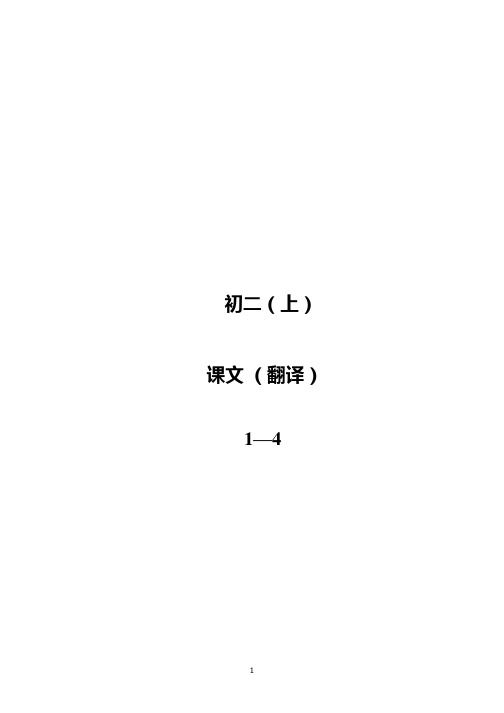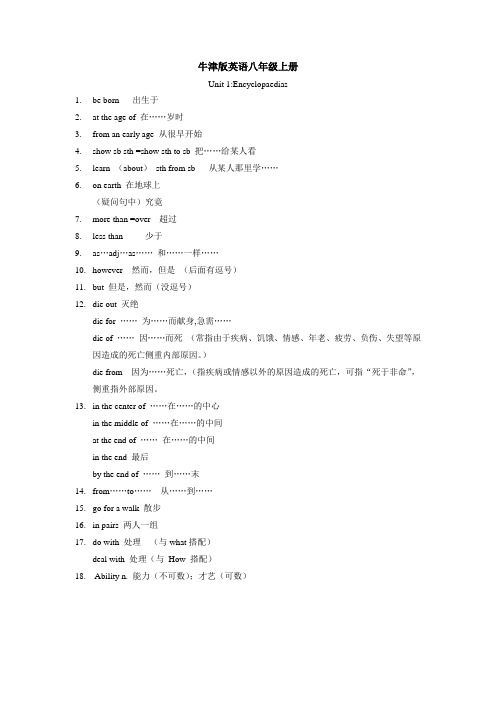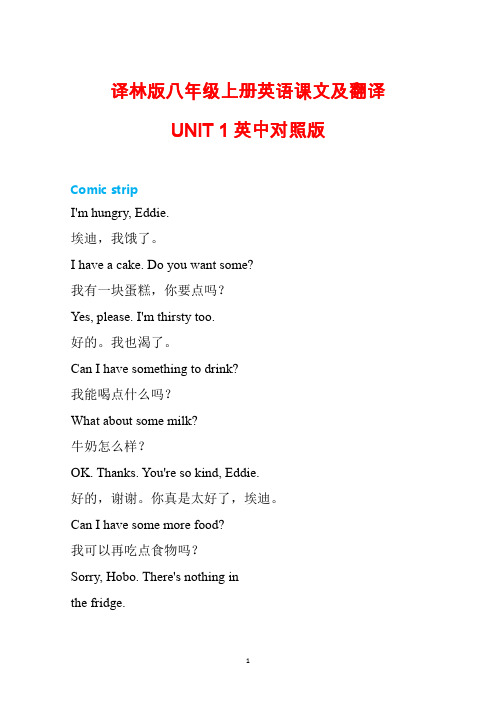八年级牛津版上册unit1-课文
牛津深圳版(广州沈阳通用)八年级英语上册课文翻译

Unit 1 EncyclopaediasLook it up!查找它Here are two articles from an encyclopaedia.这里有来自百科全书的两篇文章。
Da Vinci, Leonardo列奥纳多•达•芬奇Leonardo da Vinci (1452-1519) was an Italian painter, inventor, musician, engineer and scientist.列奥纳多•达•芬奇(1452 - 1519)是意大利画家,发明家,音乐家,工程师和科学家。
Da Vinci was born in the countryside. From an early age, he showed great intelligence and artistic ability. As he grew older, he learnt to do many different things. His paintings are very famous, and one, the Mona Lisa, is perhaps the most famous painting in the world. He also had many inventions. For example, his notebooks include some interesting drawings of flying machines. (See Art)达芬奇出生在农村。
从很小的时候,他表现出极大的智慧和艺术才能。
当他长大时,他学会了做很多不同的事情。
他的画是非常出名的,其中一个,蒙娜丽莎,也许是世界上最著名的画。
他也有很多发明。
例如,他的笔记本包括一些有趣的飞行机器的图画。
(见艺术)Dinosaurs 恐龙Dinosaurs lived on Earth more than 60 million years before human begins. They lived everywhere on Earth. Some dinosaurs were as small as chickens. Others were as big as ten elephants. Some could even fly.恐龙生活在地球上人类6000万多年前。
(完整版)深圳牛津版英语最新八年级(上)课文(带翻译)

初二(上)课文(翻译)1—4Unit 1 Look it up! 查阅这里是两篇来自百科全书的文章。
Here are two articles['ɑːtɪk(ə)l]文章 from an encyclopaedia [ɪn,saɪklə'pidɪə]百科全书.达芬奇·莱昂纳多Da Vinci, Leanardo达芬奇·莱昂纳多(1452-1519)是意大利画家、发明家、音乐家、工程师和科学家。
Leanardo da Vinci (1452—1519) was an Italian painter['peɪntə]画家, inventor[ɪn'ventə]发明家, musician [mjuː'zɪʃ(ə)n]音乐家, engineer [endʒɪ'nɪə] 工程师and scientist.达芬奇出生在农村。
从很小的时候, 他就表现出极大的智慧和艺术能力。
随着年龄的增长, 他学会了做很多不同的事情。
他的画是非常有名的, 其中一副, 《蒙娜丽莎》, 也许是世界上最有名的画作。
他还有许多发明。
例如, 他的笔记本里有一些关于飞行器的有趣的图纸。
Da Vinci was born in出生于 the countryside['kʌntrɪsaɪd]农村.From an early age从早期开始, he showed great intelligence[ɪn'telɪdʒ(ə)ns] 智慧and artistic ability[ɑː'tɪstɪk] [ə'bɪləti]艺术才能.As当;随着 he grew older, he learnt to do many different things.His paintings['peɪntɪŋ]画作 are very famous, and one, the Mona Lisa, is perhaps the most famous painting in the world.He also had many inventions[ɪn'venʃ(ə)n]发明.For example, his notebooks['nəʊtbʊk]笔记本include[ɪn'kluːd]包括some interesting drawings['drɔː(r)ɪŋ]绘画 of flying machines [mə'ʃiːn]飞行器.Dinosaurs['daɪnəsɔː]恐龙恐龙比人类早 6000万年就生活在地球上。
牛津版英语八年级上册Unit-1主课文重点知识

牛津版英语八年级上册
Unit 1:Encyclopaedias
1.be born 出生于
2.at the age of 在……岁时
3.from an early age 从很早开始
4.show sb sth =show sth to sb 把……给某人看
5.learn (about)sth from sb 从某人那里学……
6.on earth 在地球上
(疑问句中)究竟
7.more than =over 超过
8.less than 少于
9.as…adj…as……和……一样……
10.however 然而,但是(后面有逗号)
11.but 但是,然而(没逗号)
12.die out 灭绝
die for ……为……而献身,急需……
die of ……因……而死(常指由于疾病、饥饿、情感、年老、疲劳、负伤、失望等原因造成的死亡侧重内部原因。
)
die from 因为……死亡,(指疾病或情感以外的原因造成的死亡,可指“死于非命”,侧重指外部原因。
13.in the center of ……在……的中心
in the middle of ……在……的中间
at the end of ……在……的中间
in the end 最后
by the end of ……到……末
14.from……to……从……到……
15.go for a walk 散步
16.in pairs 两人一组
17.do with 处理(与what搭配)
deal with 处理(与How 搭配)
18. Ability n. 能力(不可数);才艺(可数)。
+Unit1课文原文与翻译(素材)+022-2023学年牛津译林版八年级英语上册

译林版八年级上册英语课文及翻译UNIT 1英中对照版Comic stripI'm hungry, Eddie.埃迪,我饿了。
I have a cake. Do you want some?我有一块蛋糕,你要点吗?Yes, please. I'm thirsty too.好的。
我也渴了。
Can I have something to drink?我能喝点什么吗?What about some milk?牛奶怎么样?OK. Thanks. You're so kind, Eddie.好的,谢谢。
你真是太好了,埃迪。
Can I have some more food?我可以再吃点食物吗?Sorry, Hobo. There's nothing inthe fridge.对不起,荷布。
冰箱里什么也没有了。
What about the pizza in your bowl? Maybe we can share it.你碗里的比萨怎么样?或许我们可以分着吃。
ReadingBetty is one of my best friends.贝蒂是我最好的朋友之一。
She is slim and has short hair.她很瘦并且留着短头发。
Betty is generous.贝蒂很大方。
She is willing to share things withher friends.她乐意与她的朋友分享东西。
She is also helpful and ready tohelp people any time.她还乐于助人并且在任何时候都愿意帮助他人。
She helps me with my homeworkand she always gives her seat onthe bus to someone in need.她帮助我完成家庭作业,她总是在公交车上让位给有需要的人。
牛津英语八年级第一学期课文翻译

(P3)Unit One查查看!下面是两篇来自百科全书的文章。
列奥纳多-达-芬奇列奥纳多-达-芬奇(1452-1519)是意大利画家、音乐家、发明家、工程师和科学家。
达-芬奇出生在农村。
从幼年起,他就表现出国人的智慧和艺术才能。
随着年龄的增长,他学会了做许多不同的事情。
他的画非常有名。
其中一幅,《蒙娜丽莎》,或许是世界上最著名的油画。
达-芬奇还有许多发明。
例如,他的笔记本中包括一些有趣的飞行器的图纸。
(参见“艺术”)恐龙恐龙生活在地球上比人类早六千多万年。
它们生活在地球上的各个角落。
有些恐龙像鸡一样小。
其他的有十头大象那么大。
有的甚至会飞。
许多恐龙以植物为食。
但是也有一些恐龙喜欢吃肉。
恐龙在地球上生活了超过一亿五千万年。
后来,突然间,它们都灭绝了。
没有人知道这是为什么。
不过我们可以通过恐龙化石去了解它们。
(参见“地球的历史”)(P13)Unit One 澳大利亚的巨大景点澳大利亚是一个幅员辽阔的国家。
它还有许多的巨大景点。
大香蕉“大香蕉”在科夫斯港。
它是由约翰兰迪建于1964年。
兰迪想要什么东西能吸引人们来他的水果店,于是他建造了“大香蕉”。
这个想法十分奏效。
许多人慕名到他的水果店来拍“大香蕉”的相片。
很快,全澳大利亚的人都开始做巨大的东西。
大美利奴大美利奴羊巨型雕塑在古尔本市内。
美利奴是一种绵羊,它们可以生活在干燥的气候中。
澳大利亚的一些地方非常干燥,所以这些羊对当地的农民来说非常重要,在大美利奴发热内部,有一个关于澳大利亚羊毛历史的小型博物馆,游客还可以爬到大美利奴的头部,透过它的眼睛看风景。
(P19)Unit two国王与稻米很久以前,印度有个国王,他最喜欢的游戏是下国际象棋。
一天,一位睿智的老人来到王宫,国王向他发起下棋挑战。
国王对老人承诺:“如果赢了我,你可以得到任何奖赏。
”老人说,“如果我赢了,我想要稻米,在棋盘的第一格里放一粒稻米,在第二个格里放两粒,第三个格里放四粒,然后其余每个格里依次增加一倍的稻米数量。
牛津深圳版(广州沈阳通用)八年级英语上册课文翻译

Unit 1 EncyclopaediasLook it up!查找它Here are two articles from an encyclopaedia.这里有来自百科全书的两篇文章。
Da Vinci, Leonardo列奥纳多•达•芬奇Leonardo da Vinci (1452-1519) was an Italian painter, inventor, musician, engineer and scientist.列奥纳多•达•芬奇(1452 - 1519)是意大利画家,发明家,音乐家,工程师和科学家。
Da Vinci was born in the countryside. From an early age, he showed great intelligence and artistic ability. As he grew older, he learnt to do many different things. His paintings are very famous, and one, the Mona Lisa, is perhaps the most famous painting in the world. He also had many inventions. For example, his notebooks include some interesting drawings of flying machines. (See Art)达芬奇出生在农村。
从很小的时候,他表现出极大的智慧和艺术才能。
当他长大时,他学会了做很多不同的事情。
他的画是非常出名的,其中一个,蒙娜丽莎,也许是世界上最著名的画。
他也有很多发明。
例如,他的笔记本包括一些有趣的飞行机器的图画。
(见艺术)Dinosaurs 恐龙Dinosaurs lived on Earth more than 60 million years before human begins. They lived everywhere on Earth. Some dinosaurs were as small as chickens. Others were as big as ten elephants. Some could even fly.恐龙生活在地球上人类6000万多年前。
牛津版英语八年级上册Unit-1副课文及重点知识
牛津版英语八年级上册Unit 1:Encyclopaedias1.be born 出生于2.at the age of 在……岁时3.from an early age 从很早开始4.show sb sth =show sth to sb 把……给某人看5.learn (about)sth from sb 从某人那里学……6.on earth 在地球上(疑问句中)究竟7.more than =over 超过8.less than 少于9.as…adj…as……和……一样……10.however 然而,但是(后面有逗号)11.but 但是,然而(没逗号)12.die out 灭绝die for ……为……而献身,急需……die of ……因……而死(常指由于疾病、饥饿、情感、年老、疲劳、负伤、失望等原因造成的死亡侧重内部原因。
)die from 因为……死亡,(指疾病或情感以外的原因造成的死亡,可指“死于非命”,侧重指外部原因。
13.in the center of ……在……的中心in the middle of ……在……的中间at the end of ……在……的中间in the end 最后by the end of ……到……末14.from……to……从……到……15.go for a walk 散步16.in pairs 两人一组17.do with 处理(与what搭配)deal with 处理(与How 搭配)18. Ability n. 能力(不可数);才艺(可数)Australia’s big attractionsAustralia is a very big country. It also has many big attractions.The Big BananaThe Big Banana is in Coffs Harbour. It was made in 1964 by John Landy. Landy wanted something to make people come to visit his fruit shop, so he built the Big Banana. Soon people all over Australia began to make big things.The Big MerinoThe Big Merino is in the city of Goulburn. Merinos are a type of sheep. They can live in dry weather. Some places in Australia are very dry, so these sheep are very important to the farmers there. Inside the Big Merino, there is a small museum about the history of wool in Austria. Visitorscan also climb up to the Big Merino’s head and look at the view through its eyes.1.be made in 在……制造2.Take pictures of ……照相3. a type of 一种……4.all kinds of 各种各样的……e n.----usefull adj. 有用的-------useless adj. 无用的6.look up 查阅,查字典look for 寻找look after 照顾look out =watch out 小心look forward to(介词)期盼……look like 长得像7.paint v.--------painter n. 画家8.invent v.--------inventor n. 发明家9.learn sth 学习……learn to do sth 学习做某事10.pick up 捡起11.be famous for 因……而出名be famous as 作为……而名12.Place of interest 名胜13.include v. 包含,包括including prep. 包含,包括e out of 从……中出来15.outside prep. 在外面16.inside prep. 在里面ed to do sth 过去常常做……be used to doing sth 习惯做某事18.help sb (to) do sth 帮助某人做某事help sb with sth 帮助某人做某事can’t help doing sth 忍不住做……help oneself to 随便吃……19.just like 正如something interesting 有趣的东西20.remember to do sth 记得去做某事remember doing sth 记得做过某事21.get on 上车get off 下车22.It is adj for sb to do sth 某人做某事怎么样look through 浏览go through 穿过,通过23. a number of 许多……the number of ……的数量24.consist of 由……组成。
八年级英语上册上海牛津版 U1 课文
Unit 1 Penfriendstext1. know the name of2. rugby3. top-right corner4. signature5. above -- below6. the whole day = all day7. postcode8. a group of letters and numbers9. be part of10. A postcode makes it easier for the post office to deliver letters.11. tell you something about myself12. You can call me Jon.13. about one and a half meters tall14. Playing chess is my hobby.15. own a Chinese restaurant16. be at university17. during the holidays18. be keen on = be fond of19. My ambition is to be a/an ...20. an ambitious man21. It is beautiful, isn't it ?22. a photo of myselfa photo of mine23. the meaning of24. live a meaningful life25. for example26. play squash27. even if28. other/others/the other/the others/another29. a kind of sport30. idle = lazy31. train sb to do sth32. trainer33. junior high school34. senior high school35. do well in = be good at36. tick the boxes of the things he writes about37. He often feels unhappy, _______ _______ ?38. Find facts in the letter that tell you they are probably true.39. go to university40. leave school41. question words42. at the beginning of43. write the questions correctly44. put sth in the right order45. begin with -- end with46. an honest person47. describe48. description49. match ... with ...50. at the end of51. make a similar conversation52. introduce A to B53. introduce oneself54. introduction55. reply to56. alone/lonely57. imagine that you are writing to another penfriend in Canada58. use capital letters where necessary59. a girl from Germany60. two Germans61. pop music62. learn to do sthlearn doing sth63. native language64. quite/quiet65. be very close to...66. share one bedroom67. attend school68. from all over the world69. e-mail sb70. maybe/may be71. look back。
牛津译林版八年级上册Unit 1《Friends》(Main task)教学设计
牛津译林版八年级上册Unit 1《Friends》(Mn task)教学设计一. 教材分析《Friends》是牛津译林版八年级上册Unit 1的一篇课文,主要讲述了朋友之间相互关心、支持和帮助的故事。
本文通过描述两个好朋友Andy和Sarah在日常生活中所遇到的困境,以及他们如何相互鼓励、共同解决问题,从而让学生学会珍惜友谊,懂得在困难面前互相支持的重要性。
二. 学情分析八年级的学生已具备一定的英语基础,能够听懂、读懂简单的英文故事,并能运用所学知识进行简单的交流。
但部分学生对英语学习仍存在恐惧心理,缺乏自信心。
针对这一情况,教师在教学过程中应注重激发学生的学习兴趣,鼓励他们积极参与课堂活动,提高他们的语言运用能力。
三. 教学目标1.知识目标:–能够听懂、读懂《Friends》这篇课文;–能够运用所学的词汇和句型介绍自己的朋友;–能够运用所学知识描述朋友之间的相互关心和支持。
2.能力目标:–能够用英语进行简单的交流,提高口语表达能力;–能够通过阅读课文,提高阅读理解能力。
3.情感目标:–学会珍惜友谊,懂得在困难面前互相支持的重要性;–培养学生的团队协作精神,增强班级凝聚力。
四. 教学重难点•词汇:friend, friendliness, support, encourage, solve problems等;•句型:- How’s your friend? He/She is…•What can I do for you? I can…•理解课文内容,把握人物关系和情感变化;•运用所学知识进行实际操作,如编写故事、角色扮演等。
五. 教学方法1.任务型教学法:通过完成各种任务,让学生在实践中学会运用所学知识;2.情境教学法:创设生活情境,让学生在真实环境中感受、体验英语;3.情感教学法:以情感人,激发学生的学习兴趣,培养他们的情感态度。
六. 教学准备1.教材:牛津译林版八年级上册Unit 1《Friends》;2.多媒体设备:电脑、投影仪、音响等;3.教学课件:根据教学内容设计的课件;4.教学素材:相关图片、视频等。
英语1-8单元的翻译
很久很久以前,有个印度的国王。国王最喜欢的比赛是国际象棋。
有一天,一个睿智的老人来到皇宫,国王向他挑战比赛。国王允诺老人:“如果你赢得比赛你可以拥有任何奖品,。”
老人说“如果我赢得比赛:,我想要一粒大米在棋盘的第一个方格,两粒在第二个,四粒在第三个,然后使每个剩余的方格在数量上加倍。”
The Big Banana
The Big Banana is in Coffs Harbour. It was made in 1964 by John Landy. Landy wanted something to make people come to his fruit shop, so he built the Big Banana. The idea worked. Many people visited his fruit shop and took pictures of the Big Banana. Soon people all over Australia began making big things.
Many dinosaurs ate plants. However, some dinosaurs liked to eat meat.
Dinosaurs lived on Earth for more than 150 million years. Then, suddenly, they all died out. Nobody knows why. However, we can learn about them from their fossils. (See Earth history)
Finally, people began to develop systems of written marks to show different numbers, and this led to the Hindu---Arabic system(0-9). We are still using this system today.
- 1、下载文档前请自行甄别文档内容的完整性,平台不提供额外的编辑、内容补充、找答案等附加服务。
- 2、"仅部分预览"的文档,不可在线预览部分如存在完整性等问题,可反馈申请退款(可完整预览的文档不适用该条件!)。
- 3、如文档侵犯您的权益,请联系客服反馈,我们会尽快为您处理(人工客服工作时间:9:00-18:30)。
八年级牛津版上册unit1-课文Unit 1 Encyclopaedias一、词汇课文复现二、词汇句型语法知识拓展三、高频词汇inventor include musician win find out四、语法专题复合不定代词some any somebody anybody nobody(some和any)被动语态初步认识五、课文重点句型及短语归纳1. encyclopaedia n.百科全书2. human adj.人的3. dinosaur n.恐龙4. ﹡Italian n.意大利人,Italy n 意大利All roads lead to Rome.(谚)条条大路通罗马;殊途.Rome was not built in a day.(谚)罗马城不是一天建成的;伟业非一日可成When in Rome do as the Romans do.5. inventor n. 发明家6. musician n. 音乐家7. scientist n.科学家8. born v. (be born)出生9. countryside n.乡村; 农村The Italian musician was born in France, and when he was at the age of five, he together with his parents moved to Italy.He liked drawing , playing music and inventing things at school. He had many inventions, so he was a famous inventor in the world.10. intelligence n.才智;智慧11. ﹡artistic adj. 有艺术天赋的12. ability n. 才能;能力13. perhaps adv.可能;大概14. invention n. 发明15. notebook n. 笔记本16. include v. 包括;包含17. even adv. (强调出乎意料) 甚至18. however adv. 然而19. suddenly adv.突然;忽然20. nobody pron. 没有人21. ﹡fossil n. 化石22. win v. (won, won) (在比赛中)获胜,赢23. dollar n.元(美国、加拿大等国货币单位)24. in the countryside在乡村;在农村25. human being人26. die out灭绝;消失27. find out了解(到);弄清28. go for a walk去散步一、词汇课文复现一、课文再现Look it up!Here are two articles from an encyclopaedia.Da Vinci, LeonardoLeonardo da Vinci (1452-1519) was an Italian painter, inventor, musician, engineer and scientist.Da Vinci was born in the countryside. From an early age, he showed great intelligence and artistic ability. As he grew older, he learnt to do many different things. His paintings are very famous, and one, the Mona Lisa, is perhaps the most famous painting in the world. He also had many inventions. For example, his notebooksinclude some interesting drawings of flying machines. (See Art)DinosaursDinosaurs lived on Earth more than 60 million years before human begins. They lived everywhere on Earth. Some dinosaurs were as smallas chickens. Others were as big as ten elephants. Some could even fly. Many dinosaurs ate plants. However, some dinosaurs liked to eat meat.Dinosaurs lived on Earth for more than 150 million years. Then, suddenly, they all died out. Nobody knows why. However, we can learn about them from their fossils. (See Earth history)查找它这里有来自百科全书的两篇文章。
列奥纳多•达•芬奇列奥纳多•达•芬奇(1452 - 1519)是意大利画家,发明家,音乐家,工程师和科学家。
达芬奇出生在农村。
从很小的时候,他表现出极大的智慧和艺术才能。
当他长大时,他学会了做很多不同的事情。
他的画是非常出名的,其中一个,蒙娜丽莎,也许是世界上最著名的画。
他也有很多发明。
例如,他的笔记本包括一些有趣的飞行机器的图画。
(见艺术) 恐龙恐龙生活在地球上人类6000万多年前。
他们生活在地球各个地方。
一些恐龙和鸡一样小。
其他的有十头大象一样大。
一些甚至可以飞。
许多恐龙吃植物。
然而,一些恐龙喜欢吃肉。
恐龙在地球上生活了1.5亿多年。
然后,突然,他们都灭绝了。
没有人知道为什么。
不过,我们可以从化石中了解他们。
(见地球历史)P.13 More practiceAustralia's big attractionsAustralia is a very big country. It also has many big attractions.The Big BananaThe Big Banana is in Coffs Harbour. It was made in 1964 by John Landy. Landy wanted something to make people come to his fruit shop, so he built the Big Banana. The idea worked. Many people visited his fruit shop and took pictures of the Big Banana. Soon people all over Australia began making big things.The Big MerinoThe Big Merino is in the city of Goulburn. Merinos are a type of sheep. They can live in dry weather. Some places in Australia are very dry, so these sheep are very important to the farmers there. Inside the Big Merino, there is a small museum about the history of wool in Australia.Visitors can also climb up to the Big Merion’s head and look at the view through its eyes.二、词汇句型语法知识拓展1.painter paint动词改为名词加上后缀-erteach- teacher sing-singerread-reader visit- visitorinvent-inventor有些动词加上-er或者加上-or变为名词多指男性,若指女性加后缀-ressactor- actresswaiter-waitresstailor-tailoressauthor-authoress2.cook n./v.3. I have some questions about dinosaurs.About指代内容比较普遍,on 暗指内容是专门的,是学术性的4. There isn’t anybody in the room.1)不定代词为单数2)There be这里有5. 复合不定代词Is there anything on the blackboard? (P9)Is there anything on the noticeboard? (P9)Is there anybody above the teacher? (P9)Is there anybody by the window? (P9)Is there anything above the teacher? (P9)Is there anything under the teacher's desk? (P9)Is there anyone behind the teacher? (P9)Is there anything on the bookcase? (P9)Is there anyone next to the piano? (P9)Grammar复合不定代词1、some 和anysome 和any都可以修饰可数名词复数或者不可数名词,表示“一些…….”,但是二者在用法上还是有一定的区别的。
2、some一般用于肯定句或者表示请、建议并希望得到肯定答复的疑问句中。
David has some friends in shanghai.May I have some chicken?Would you like some noodles?3、 any一般用于否定句和疑问句中Mary hasn’t got any pens.玛丽没有钢笔。
(1) It’s polite to take flowers as a gift when you go to visit a friend.A. littleB. anyC. some(2) There isn’t water in the glass. Let’s go and get some.A. manyB. lotsC. anyD. some4、复合不定代词高频考点1)I saw nobody.2)There is not anybody in the room.3)Is there anything on the bookcase?复合不定代词一般是用some, any, no, every与one, thing, body组合构成的。
